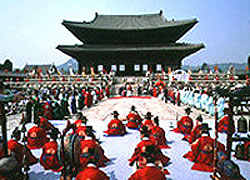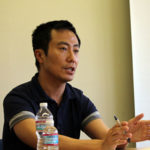Introduction: a Shifting Paradigm
South Korea has been one of the most ambitious and progressive countries in Asia in the last fifty years. It’s ancient culture has assimilated, for better or worse, many western ideas and systems. Along with the changes in commerce have come alterations in human behavior and attitudes, including a recent softening toward homosexuality by means of high tech communication and age-old drama. “Gay Life in South Korea” is now less about secrets and more about cautious pride and community.
By Richard Ammon
GlobalGayz.com
Revised March 2012
Buttoned-Down Traditions
Living gay in Korea, in Seoul, is not very different from other major Asian cities. Mostly hidden in clubs and bars, pigeon-holed off to late dancing or drinking with friends and stashed far from family business, gay Koreans live within a very strong heterosexual tradition that includes more than just the expectations of taking a spouse.
Family members are woven into a tightly knit social web 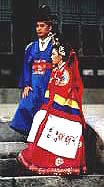 that prescribes much of life from birth to death, most notably as a young adult. Until marriage, you live at home and obey the rules.
that prescribes much of life from birth to death, most notably as a young adult. Until marriage, you live at home and obey the rules.
From birth, be obedient, go to school and get superior grades. Then, make every effort to get into a university and graduate with honors; take a respectable job and build a career that parents can be proud of; help support the family; spend money to look prosperous and save more money for the major event of marriage. Then the goal is to have cute children (for happy grandparents) and work overtime to pay the debts of trying to live too well.
After the marriage settles down, husbands often find some time to hang out with fellow worker bees in cafes, restaurants and bars, and perhaps (following an unspoken tradition) have an affair on the side. Eventually their is growing old, doting on the grandchildren and being looked after by your children.
It’s all part of a cradle to grave system of tradition and conformity that few dare to challenge.
Unexpected Glitch
Enter the gay man trying to negotiate this maze of watchful circumstances, trying to comply and avoid at the same time. It is often a frightful dance of sacrifice and self-respect, honor and deception that no one would choose but many are forced into.
Matt is a young Korean, mid twenties, who lives with his family, goes to school three days a week and works part time as a writer for a cable TV channel writing film summaries. He is college bound, loves his parents and sister who all share their modest home. His plans include graduate studies in New York or California. As a prototype of Korean youth, he is intelligent, educated, a devoted son, wastes little time in excess or frivolity and is articulate in English. He is ready for the future.
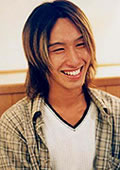 Except for one major difference: his intention of studying in the USA is equally, if not more, motivated by his need to breathe vitality into his emotional life as a gay man.
Except for one major difference: his intention of studying in the USA is equally, if not more, motivated by his need to breathe vitality into his emotional life as a gay man.
“I had a boyfriend for three years but we could never live together. We are friends now. There was no time to be alone, not enough. So it is easier this way. I want my future in the US. It is a better gay life there,” he said with a mixture of hope and regret.
His relationship with Kim was worn down by the need to keep silent and separate most of the time. Only occasionally, when one of their families was away could they spend the night together. On the rare sleep-over, with parents at home, they used the excuse that they had been out drinking and it was not wise to drive. Otherwise, they hardly had contact with each other’s families.
Little Visibility
Korean gay couples rarely live together because of this strong family obligation. Matt said being gay is a very quiet secret. If it were known that he is gay, he could easily loose his job, especially in a big company. He cannot think about telling his family, “they would be shocked and try to change me. That is why I want to go away to study. I will be stronger in the future and feel more confident to tell them if I need to.”
He went on to say that, in Korea, homosexuality is not legal and not illegal. It’s simply not talked about. It was likely that Confucius never thought about it and neither did the lawmakers, ancient or modern. (By chance, during my stay the Korean Times newspaper printed a sprawling half page story about (western) lesbians in the entertainment industry featuring a photo of Ellen and her real-life girl friend. But folks like that were far away in the USA! Not a word was said about homosexuality in modern Korea.)
There are no gay parades here yet but a few gay organizations have formed such as Kirikiri and Sappho (lesbian groups), Chingusai (gay men’s group) and the Coalition of Student Gay Rights Groups. Most of the universities now have gay clubs that keep a low profile.
Big Permutation
The biggest change in the ‘scene’ is not in the clubs or bars or activism, although these have increased in the past five years. More  invisibly and much more popular, gays and lesbians are networking on the Internet and getting a life–chatting, arranging friendships and organizing activities.
invisibly and much more popular, gays and lesbians are networking on the Internet and getting a life–chatting, arranging friendships and organizing activities.
Just before I left for Seoul, I typed in “Korea gay” into a search engine and was connected to the Korean BB room where an active list of notices had been recently posted. I replied to three of them and received prompt replies. Matt was among them. The gay cyber-community in Asia is bursting out of the closet and crowding into chat rooms, bulletin boards, Yahoo/eGroups and specific web pages.
At Gay Korea (www.geocities.com/WestHollywood/2510/), for example, a surfer is greeted with the following upbeat message from the creative and bold site owner:
“Welcome to Gay Korea. This web page is for Korean gays and foreigners who want to meet Korean friends, visit Korea, or just know more about Korea. Korea is one of the world’s more beautiful countries. It is graced with grand and delicate scenery, and is occupied by people of a kind and welcoming disposition, especially its gay and lesbian communities…just perfect!”
He goes on to say, “Korea is a conservative country regarding gay/lesbian issues. Most of people think homosexuality is a kind of psychological problem, or a cause of AIDS. Most images in the mass media present a very prejudice and narrow view of gays and lesbians.
“Actually, the situation for the Korean gay community is getting better in recent years, with the opening of many gay bars, night clubs and saunas. You can find some information about these places and how to get there, in my web page.
“This year realized the dream of the first Korean Gay Film Festival in Seoul; it was prohibited last year by the police. The gay magazine, Buddy was also first published this year and there are now some organized gay/ lesbian community groups at some universities, or on the Internet.
 “The development of Internet gay/lesbian community has been especially rapid and impressive. It is probably the most liberated medium for expression by our community in Korea. Hopefully it is the first of many other liberations…”
“The development of Internet gay/lesbian community has been especially rapid and impressive. It is probably the most liberated medium for expression by our community in Korea. Hopefully it is the first of many other liberations…”
Finally he concludes, “I think the most important element in inter-cultural relationships, is trying to understand each other. I hope my web page helps people from all cultural backgrounds understand “the difference” in each other. Cheers!!”
The introduction by this young Korean native is remarkable in its muscular optimism about a new dawn for the lesbigay community which has lived in deep shadows for countless generations. Even as recently as five years ago, this same man and indeed, virtually all queer Koreans, were forced to live a lives of loneliness and emotional isolation with their secret. As of this writing there were over 1600 postings on his bulletin board link.
Separate Realities
On Saturday night Seoul comes alive longer and louder than any other night. The stress of containment is released then, and for some the night lasts from sundown to sun up. Tucked into basements and little alleys in the Itaewon area south of the soaring Seoul Tower and adjacent –no surprise–to the sprawling US 8th army base, Itaewon offers the full gamut of off-time leisure to soldiers and civilians alike. From fluorescent donut shops to the sleazy dim intrigue of massage parlors sporting red velvet sofas, the noisy and trendy straight discos, dives and fast food joints offers enough distraction and amusement to mask a dozen gay bars and discos.
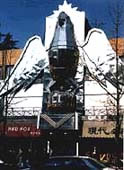 I found one of them with the rather butch name of ‘Spartacus’, located in the basement of the nondescript “JFK” building half way along a back alley. I was all but invisible except for a small red neon sign over the door. Downstairs on the smoky and music-drenched dance floor Korean boys were letting down their dark hair and bouncing to the latest disco tunes.
I found one of them with the rather butch name of ‘Spartacus’, located in the basement of the nondescript “JFK” building half way along a back alley. I was all but invisible except for a small red neon sign over the door. Downstairs on the smoky and music-drenched dance floor Korean boys were letting down their dark hair and bouncing to the latest disco tunes.
Around the central bar, Caucasians and more Koreans stood holding drinks in that universal posture of trying to look relaxed while rubbernecking each face that entered. It was far too noisy to make any conversation, but perhaps none was needed. It was Saturday midnight and time to get down and feel the beat. After a quick walk around, looking at faces, I resurfaced to cleaner and cooler air.
Itaewon is also home to other gay venues such as Zipper (its possible to fall down the stairs because the lighting is poor), Out Class (quiet, good for chatting), Trance (drag show on weekends), Why Not? (haven for late night munchies), California (stunning staff with excellent English), and Zone (nice place for a break from the crowds). Surrounding these furtive watering holes are dozens of noisy and raunchy straight bars crowded with raucous off-duty servicemen looking to get drunk or laid–or both.
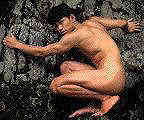 Seoul’s gay scene is also tucked into two other districts. The Gay Korea website has this helpful advice: “There are many small bars located in the center of Seoul in the Nag Weon Dong neighborhood to the north and east of Topkol Park (Independence Park). They are quite small and hard to find, Korean style, with older customers. Also, after midnight, the exterior lights are turned off and the front doors locked, to comply with local law. Bars may still be open, but you will have to know how to find the side or back entrances if the front door is locked. It is best to let a friend take you. There are gays wandering around this area who may be helpful in directing you to the bars…”
Seoul’s gay scene is also tucked into two other districts. The Gay Korea website has this helpful advice: “There are many small bars located in the center of Seoul in the Nag Weon Dong neighborhood to the north and east of Topkol Park (Independence Park). They are quite small and hard to find, Korean style, with older customers. Also, after midnight, the exterior lights are turned off and the front doors locked, to comply with local law. Bars may still be open, but you will have to know how to find the side or back entrances if the front door is locked. It is best to let a friend take you. There are gays wandering around this area who may be helpful in directing you to the bars…”
All in all, not a bad scene for a culture which prefers to deny the existence of homosexuality. It wasn’t hard to test the alleged quietude away from Itaewon. The next night, across town, adjacent to Pagoda park, a third floor walk-up bar called Freetime was barely alive; almost no pulse. Three patrons at the bar talked quietly as soft rock music filled the background. The three were Korean and didn’t speak English–and I knew no Korean. That tended to minimize our conversation. After a coke I drifted out, with the trio still in place, still chatting almost inaudibly.
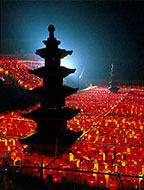 If you want something even quieter (not gay), try the Lotus Lantern Buddhist Center near the Kyongbokkong Palace. They offer meditation, tea and conversation. Koreans and westerners attended the hour of Zen sitting session. During the complete silence of the sitting, my mind wandered, as it usually does, to recent events.
If you want something even quieter (not gay), try the Lotus Lantern Buddhist Center near the Kyongbokkong Palace. They offer meditation, tea and conversation. Koreans and westerners attended the hour of Zen sitting session. During the complete silence of the sitting, my mind wandered, as it usually does, to recent events.
I thought about the young gay man I spoke to at breakfast in my hotel. We chatted about his brief life in Seoul. Hired as an English teacher at one of the competitive evening schools, he was about to break his contract and fly home the next night without telling anyone at school. “You can’t believe the pressure and competition to teach these kids perfect English–as fast as possible. I don’t know how the kids stand it, and the teachers have to make sure they don’t fail any tests. It’s crazy…I’m out of here!”
He also lamented the virtual absence of a gay community. “I guess it’s OK if you’re Korean. I mean, it’s so hard to meet other guys. They’re either up tight in the Army (US) or tourists here for a week or they’re native and have a straight life with their family. The language is a big barrier too…” So he was furtively returning to his own culture and gay world in Dallas. I told him I thought his chances there were much better–and they speak better English there, but still with an accent.
Public Changes
Last year, a couple of public events hinted at a shift in the staunch Confucian-Christian anti-gay attitude in Korea.
On August 4, 2000, the ‘Korea Herald’ newspaper reported a controversial new arrival in Seoul: “The first show of its kind ever staged in notoriously homophobic Korea, the Hahahoho Show features an all-gay cast of nine homosexuals and nine transsexuals. This, of course, is proving to be a major shocker to conservative Koreans.”
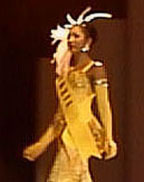 The report continued, “but it’s a long overdue social change, said the show’s founder, ex-comedian Kim Hyung-kon. ‘This is Korea’s first gay show ever. That should tell you how far behind we are in social maturity,’ Kim said. ‘All the other countries, like the U.S., England, Japan and Thailand, have long since recognized the talent of gay members of their communities and used them to help build successful tourism industries.’
The report continued, “but it’s a long overdue social change, said the show’s founder, ex-comedian Kim Hyung-kon. ‘This is Korea’s first gay show ever. That should tell you how far behind we are in social maturity,’ Kim said. ‘All the other countries, like the U.S., England, Japan and Thailand, have long since recognized the talent of gay members of their communities and used them to help build successful tourism industries.’
The nightly shows held at the restaurant consist of two parts. The first, which is most specifically aimed at foreigners, is a 70-minute parody concert, in which singers imitate famous vocalists perfectly lip-synced by he-she performers dressed in mega-elegant evening gowns.
The hour-long second part features dance numbers by the entire cast, “all of whom are dressed in metallic underwear, and solo performances by dancers clad in scanty outfits. There are no ‘obscene’ scenes, though there is some screened nudity. But nothing will delight, surprise or puzzle the audience more than the extraordinary feminine beauty of the performers”, said the lengthy news column.
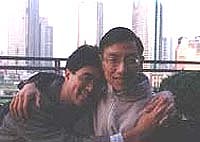 “There are still no respectable jobs available to those who choose not to hide their sexual orientation. Thus, the second major goal for Hahahoho was to give gays the opportunity to live their lives honestly and out in the open. ‘I wanted to provide them with a chance to work in a healthy environment as active members of society, and to reclaim their identities and self-respect,’ Kim said…”
“There are still no respectable jobs available to those who choose not to hide their sexual orientation. Thus, the second major goal for Hahahoho was to give gays the opportunity to live their lives honestly and out in the open. ‘I wanted to provide them with a chance to work in a healthy environment as active members of society, and to reclaim their identities and self-respect,’ Kim said…”
The performers share their life stories with the audience to help satisfy their curiosity about transsexuals by holding half-hour question-and-answer sessions between the show’s two acts. “We thought this might help get rid of prejudice arising from ignorance about gays,” Kim said with half an eye to the added entertainment value of such informal sessions.
The story concluded with, “a change in public attitudes may be taking place, considering that Koreans seem more open to the idea of homosexuality, at least more so than before Hahahoho opened. Koreans have been slow to embrace the show, Kim said, but the response has been positive, giving hope to those who may never have seen a bright future for themselves. ‘I don’t know what to make of it yet, but it’s very interesting,’ one young woman audience member said. ‘It’s different. And it’s different from the kind of show I first conjured up,’ said a male attendee.”
An Unlikely Hero
Another occasion that recently forced the Korean public to sit up and take notice of homosexuality was a popular TV comedian /actor who was pressed to out himself last year. He was subsequently fired from his prime time show amid much controversy–perhaps the biggest and most dramatic in modern Korea.
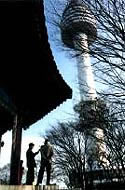 In numerous magazines, TV and radio talks shows and newspapers, including the Christian Science Monitor of January 17, 2001, Hong Seok-chon’s real life story put homosexuality onto the national circuit. Some abhorred the immorality threatening traditional values while others wanted him to stand up and be proud, seeing him as writing a new page in Korea’s long repressed attitudes about sexuality, especially gay rights.
In numerous magazines, TV and radio talks shows and newspapers, including the Christian Science Monitor of January 17, 2001, Hong Seok-chon’s real life story put homosexuality onto the national circuit. Some abhorred the immorality threatening traditional values while others wanted him to stand up and be proud, seeing him as writing a new page in Korea’s long repressed attitudes about sexuality, especially gay rights.
For many, Hong still remained popular. “The important thing is he makes us laugh,” said one teenage girl, as Hong autographed his name across her wrist. “Even straight people are talking about it now,” said a gay computer technician. “I think he’s won a point for us … because he’s honest and brave.”
Further in his favor, the Korean Confederation of Trade Unions formed a coalition to help Hong, and held a press conference condemning any discrimination on the basis of sexual orientation. “I think the gay community is one step further here because of me,” Hong said. “Korean society has already changed a lot, and in six months or a year, things will calm down and it could be completely different.”
Perhaps he may be right. Although two-thirds of people polled about Hong believed homosexuality was wrong, 59.2 percent thought it was unfair to take Hong’s job away from him.
Under the Shade of the Rodem Tree
The sign on the wall reads: “United, Together We Go, The Rodem Tree Shade.” The words are more than a slogan for the lesbigays who meet regularly at the Korean Church Centennial Memorial Building in Seoul. They represent a life of possibility and hope, compared to the hidden life they live most of the time.
This is among the first and most daring of groups to meet for the express purpose of supporting and affirming the homosexual nature of its drop-in members.
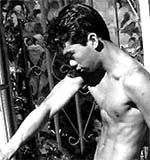 From the pages of the Korean Herald (February 12, 2001), this story appeared as a wellspring of affirmation for gay Koreans. The supportive reporter wrote: “The university students and the elite professionals sit side by side and reinforce their common denominator. It’s an infamous distinction in a country that shows minimal tolerance to people who are different. For homosexuals, who are commonly regarded as psychologically deformed and a threat to precious traditional values of family cohesion, the pariah status can be suffocating.
From the pages of the Korean Herald (February 12, 2001), this story appeared as a wellspring of affirmation for gay Koreans. The supportive reporter wrote: “The university students and the elite professionals sit side by side and reinforce their common denominator. It’s an infamous distinction in a country that shows minimal tolerance to people who are different. For homosexuals, who are commonly regarded as psychologically deformed and a threat to precious traditional values of family cohesion, the pariah status can be suffocating.
” ‘I’ve agonized over my sexual identity for a long time and this naturally led me to religion,’ said Mr. Kim, a 34-year-old banker who, like all members of the group insist on anonymity to avoid discrimination at work and being disowned by their families. ‘By being here with people who have agonized over the same thing and are searching for a solution together, I get the strength to go on.’
The report concluded: “of all the conflicts that gays confront, guilt ranks as the most severe. The religious setting of the meeting and the collective prayers palliate the acute feelings of committing serious sins. ‘Just being able to pray with similar people is extremely comforting and helps me cope with myself,’ says Mrs. Yoon, one of the group’s five lesbians…’ ”
Modern Gay History
According to one source, the modern gay community can be traced to the 1970s. But it wasn’t until 1991 when Shappo, an American soldier who treated her lesbianism as a badge of pride, formed the first visible gay group here. Two years later, a Korean-American gay man established the first Korean gay and lesbian co-gendered group.
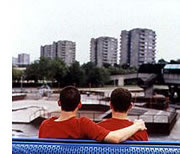 Since then, Korean gays have been gradually moving away from the underground scenes in Itaewon and Chong-no. Increasingly, gays are entering the mainstream especially at universities, forming clubs and cafes and, as is so evident from the Gay Korea website, Internet groups across the country.
Since then, Korean gays have been gradually moving away from the underground scenes in Itaewon and Chong-no. Increasingly, gays are entering the mainstream especially at universities, forming clubs and cafes and, as is so evident from the Gay Korea website, Internet groups across the country.
Now, more than 30 universities, including Seoul National University, Yonsei University and Pusan University have gay clubs. Some 20 gay cafes and pubs dot Seoul’s Itaewon district. Others are popping up in the cities of Shinchon, Hongdae, Inchon, Anyang and Ansan. The Kyongsang and Cholla provinces and even remote Cheju Island have establishments for gays now.
Shifting a heavily laden paradigm is not an easy task, especially when it is so ingrained in culture and religion. But a paradigm is still nothing more than collective ideas and ideas inevitably change when pushed by pragmatism and humanism–and art.
Visual Push
In virtually every country on earth, the advent of modern cinema has become the most influential artistic force ever invented. The ancient Greeks had live drama to portray the power of the gods over human affairs, so today the film art industry exerts similar muscle over the lives and legends of common folks.
No less so in Korea. A new force is at work here: the Seoul International Queer Film & Video Festival, an event devoted to exploring gay themes without prejudice or limitations.
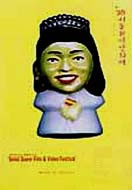 Since it began in 1998, this non-competitive, non-commercial biennial event–whose main goal is to change Korea’s homophobic attitudes–has had a great impact on Korean audiences who were previously left in the dark about the subject.
Since it began in 1998, this non-competitive, non-commercial biennial event–whose main goal is to change Korea’s homophobic attitudes–has had a great impact on Korean audiences who were previously left in the dark about the subject.
The festival was reported in the Korean Herald of August 4, 2000: “Among the most notable movies on the 2000 program are “Boys Don’t Cry” (1999), the true story of a girl who passes herself off as a boy; “The World’s Happiest Gay Couple,” an animated work that won considerable attention and praise at the 2000 Puchon International Film Festival; and “Queer as Folk,” the popular British TV drama on gay youths.
“Up until 1998, all films dealing with homosexuality were defined as too risqué for release in Korea because they went against the ‘universal values of the society.” Acknowledging the anti-gay sentiment here, the organizers of the queer filmfest organizers went ahead with plans for the first festival in 1997 without seeking permission from the government. The entire program was soon branded as illegal, its organizers threatened with fines and finally aborted…
“But due to growing protests from certain segments of the film industry and the public, the government later green-lighted the event…
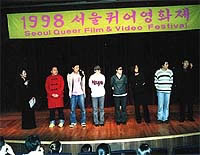 “As far for the specific program, the event was divided into five major categories: “Gay Boys go to the Theater/Gay Girls go to the Theater”; “Lesbian, Gay, Transgender Documentary,” the short film section; miscellaneous; and the Korean film segment… The Korean film section was a festival highlight as organizers pointed out the latent homosexuality in some of Korea’s most representative films. Selections on the list included director Kim Soo-hyong’s “Abstinence,” and Ha Kil-jong’s “Plant.”
“As far for the specific program, the event was divided into five major categories: “Gay Boys go to the Theater/Gay Girls go to the Theater”; “Lesbian, Gay, Transgender Documentary,” the short film section; miscellaneous; and the Korean film segment… The Korean film section was a festival highlight as organizers pointed out the latent homosexuality in some of Korea’s most representative films. Selections on the list included director Kim Soo-hyong’s “Abstinence,” and Ha Kil-jong’s “Plant.”
The festival’s programmer, Seo Dong-jin, said during a press conference held at Cafe Goma, “the Queer filmfest is more than just a movie event, it’s a social movement. It attempts to restore the life and voice of a minority group to filmmaking, and to help all gays and transsexuals realize that they are all a part of the community.”
Moving Forward
The shift is slight, compared to the weight of Korea’s long and heavy history of homophobia. But it’s a shift nevertheless in the right direction. The power of the Internet’s 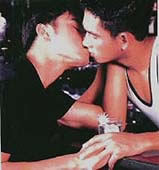 technology, the desire for Saturday night entertainment, courageous and beautiful crossdressers, the impact of a TV personality, a defiant film festival and the quiet validation of support groups–no one of these will break the prejudice of Korea’s anti-gay conceit. But together in motion with the accumulations of future endeavors and campaigns, they will bend the narrow rigidity of the old stick and make room for a fresh slender reed (with apologies to an old Korean proverb).
technology, the desire for Saturday night entertainment, courageous and beautiful crossdressers, the impact of a TV personality, a defiant film festival and the quiet validation of support groups–no one of these will break the prejudice of Korea’s anti-gay conceit. But together in motion with the accumulations of future endeavors and campaigns, they will bend the narrow rigidity of the old stick and make room for a fresh slender reed (with apologies to an old Korean proverb).
Also see:
Gay South Korea News & Reports 1999 to present
Gay South Korea Photo Gallery
RainbowTeen (Rateen) website

